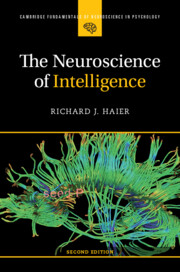Book contents
- The Neuroscience of Intelligence
- Cambridge Fundamentals of Neuroscience in Psychology
- The Neuroscience of Intelligence
- Copyright page
- Dedication
- Reviews
- Contents
- Preface to the First Edition
- Preface to the Second Edition
- Acknowledgments (First Edition)
- Acknowledgments (Second Edition)
- Chapter One What We Know about Intelligence from the Weight of Studies
- Chapter Two Nature More than Nurture
- Chapter Three Peeking Inside the Living Brain
- Chapter Four 50 Shades of Gray Matter
- Chapter Five The Holy Grail
- Chapter Six As Neuroscience Advances, What’s Next for Intelligence Research?
- Glossary
- References
- Index
- References
Chapter Six - As Neuroscience Advances, What’s Next for Intelligence Research?
Published online by Cambridge University Press: 13 July 2023
- The Neuroscience of Intelligence
- Cambridge Fundamentals of Neuroscience in Psychology
- The Neuroscience of Intelligence
- Copyright page
- Dedication
- Reviews
- Contents
- Preface to the First Edition
- Preface to the Second Edition
- Acknowledgments (First Edition)
- Acknowledgments (Second Edition)
- Chapter One What We Know about Intelligence from the Weight of Studies
- Chapter Two Nature More than Nurture
- Chapter Three Peeking Inside the Living Brain
- Chapter Four 50 Shades of Gray Matter
- Chapter Five The Holy Grail
- Chapter Six As Neuroscience Advances, What’s Next for Intelligence Research?
- Glossary
- References
- Index
- References
Summary
Chapter 6 introduces astonishing neuroscience methods for studying synapses, neurons, circuits, and networks that move intelligence research even deeper into the brain. Soon we might measure intelligence based on brain speed and build intelligent machines based on how the brain works. Collaborative efforts around the world are hunting relevant genes, creating virtual brains, and mapping brain fingerprints unique to individuals that predict intelligence. Overlapping neuro-circuits for intelligence, consciousness, and creativity are explored. Finally, this chapter introduces the terms “neuro-poverty” and “neuro-SES” (social economic status) and explains why neuroscience advances in intelligence research may inform education policies.
Keywords
- Type
- Chapter
- Information
- The Neuroscience of Intelligence , pp. 184 - 226Publisher: Cambridge University PressPrint publication year: 2023

